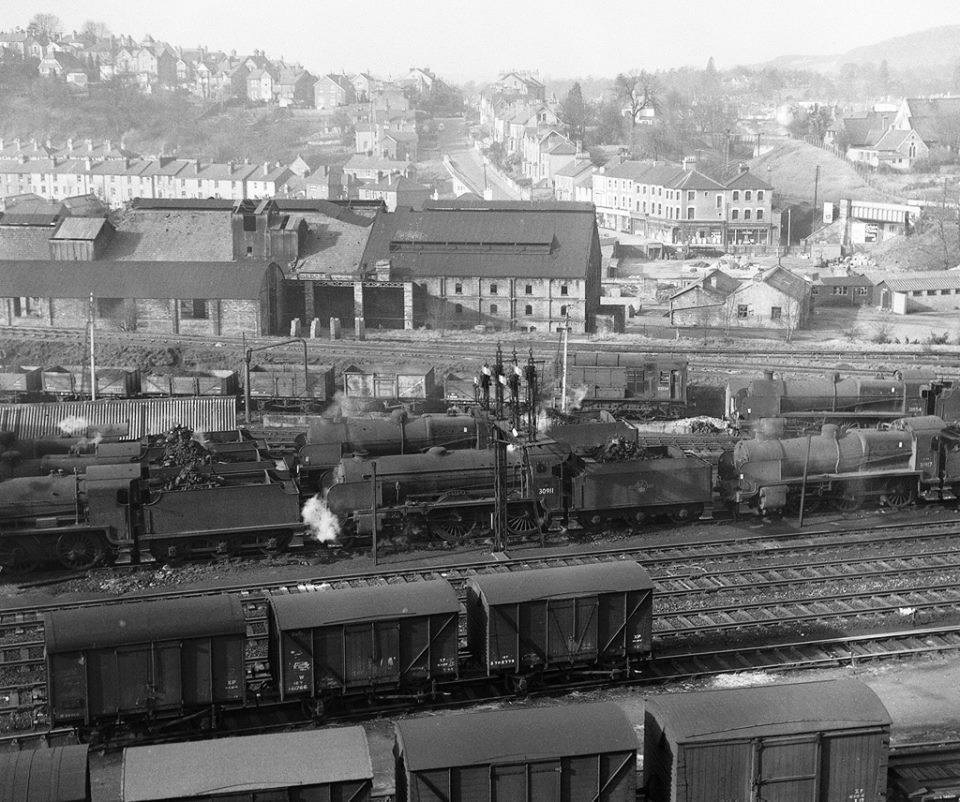Leaving School
And
Life on the Railways
Southern Region
Redhill
75 B
1955–1960
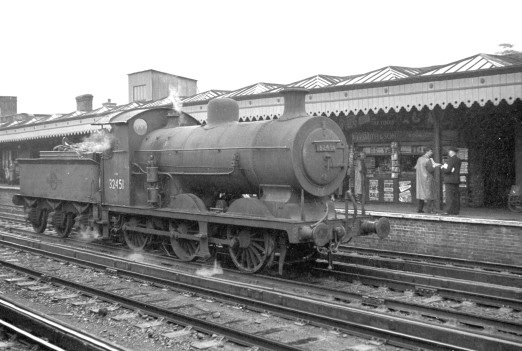
It was a cold foggy November day in 1955 when I made my way up to the Shed Master’s Office at the Redhill Motive Power Depot. As I walked along the track which I knew so well I wondered if Mr. H. Taylor, the Shed master would recognize me. If he did then perhaps he would turn me away. I was just 15 years old.
From about age of about 6 years I had a great fascination with the Railways and in particular Steam Locomotives, and now at last the day had finally arrived and I was to be interviewed for employment by the man who had in the past shouted and chased me off railway property, the reason? I was looking at the Steam Engines and collecting their numbers, known as spotting, but I was also trespassing.
About two weeks before we broke up for the Christmas holidays in 1955 I was called to the Headmaster’s office. I immediately thought, “What have I done wrong this time?” Nothing, nothing at all, the Headmaster was out. It was the Careers Employment Officer that wished to interview me. “Michael please come in and sit down.” Several questions followed and he started filling in his forms.
“Now I see you will leave school soon so have you any idea what sort of employment you would be best suited to?” “Yes” I replied “I have a job.” —–There was a long pause in the conversation. He put his pen down. “Oh where” he asked. Proudly I informed him that I had a job to the day after I left School; I was to start as a cleaner at Redhill M.P.D.
(Engine sheds) And within a year I would be a Stoker. That interview was over.
It had been a good interview with Mr. Taylor the Shedmaster; he had recognized me and at the end of our meeting I was so pleased to hear him say, “First you must have a medical examination at Brighton “I know you are keen; I have seen you around the shed from time to time. When can you start?” The very next day I had my medical and passed.
The day after leaving school arrived and it was another bitterly cold morning with a slight dusting of snow. I was to report to the Shed Foreman, Mr. Bill Mathews. “You need some kit first lad” he said. Go to the stores and get some overalls.” Having been on the shed many times I knew exactly where to go, I taped on the hatch. “Oh bol****s you can f*** off as well,” came the reply. “But I want some kit! The Forman has sent me” I shouted back. “Well come to the side door you Pratt;” was the answer. This was how I was introduced to Ginger who was the duty storekeeper that day. He was a big man who suffered badly from shell shock. He had to hang on to the walls to move around the stores. However he soon had me kitted out complete with a cap and I returned to the foreman’s office for instructions. It was 0830.
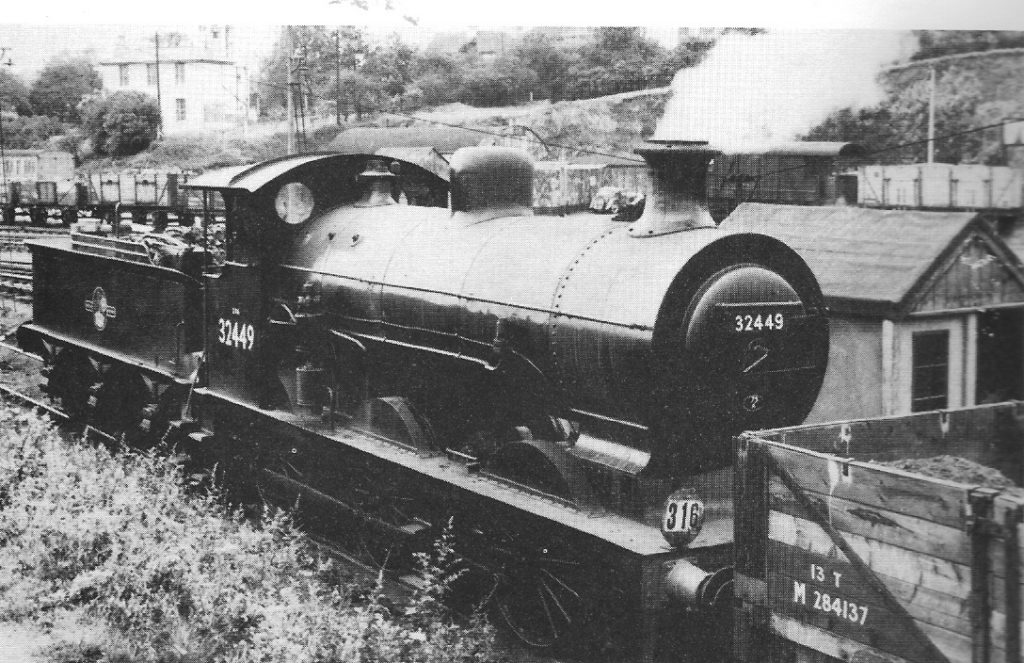
The Sand hole
Seen between goods wagon and Vulcan C2x 32449
“We need some sand,” one of the Drivers was telling Bill Mathews the foreman as I entered the office. Looking at me he said, “Well lad you can go over to the sand hole to work today and John {Bradby} here will show you what to do.” Just across the lines and to the right was a hut. Inside was a pile of damp sand which had to be dried before use. At the end of the hut stood an enclosed fire and above the fire a hopper. My job was to shovel the damp sand into the hopper and once dried, it fell through a grill onto the ground. I then got to work throwing the sand into another larger sifter and hopper. The stokers started to come in for dry sand to fill the sand boxes on their engines. On such a cold frosty morning with a lot of ice around, the engines would often slip when starting away with a heavy load. Therefore the sand was in great demand on my first day at work. I had the usual tea breaks and lunch break and met other cleaners and shed men. The day passed so quickly and it was soon time to go home. I was tired but well contented.
Christmas soon came and went and I very quickly got used to my varied duties. Technically I was employed as a cleaner but people who remember steam locomotives in the 1950s will remember there were not a lot of clean railway engines to be seen on the railways, there was always so much else to be done. I must confess all the cleaners were quite happy about that and took advantage of the situation.
Getting to know the other shed staff was an interesting experience; some of the names I remember well were Ron Howell (known to all as Rook) and his mate Harry Stockley. Ron was the story teller in the pack, mostly about his wartime experiences on the footplate. He would hold court whenever the opportunity presented itself. Harry would always agree with him when prompted. Ron always smoked a pipe and I never remember him taking his flat cap off. He even washed his face with it on; rumor was he went to bed with it. Among other names I remember were Joe Wakeford, Paddy Burns, George Humphries.
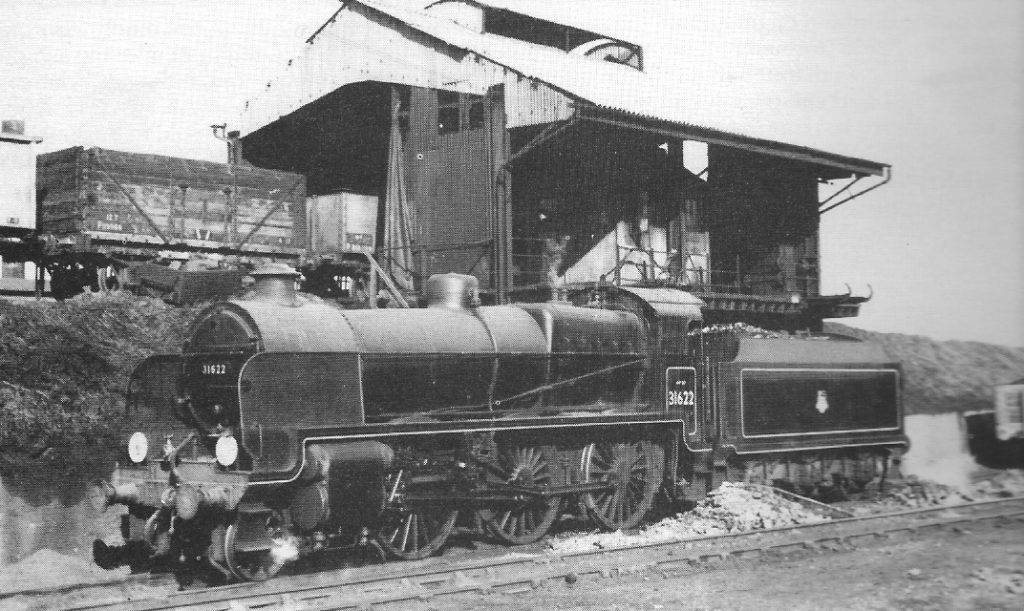
A Cleaner’s Pride
U Class 31622 at the Coal Stage on Sunday
3 March 1957 Redhill
Photograph: D. Fereday Gleen
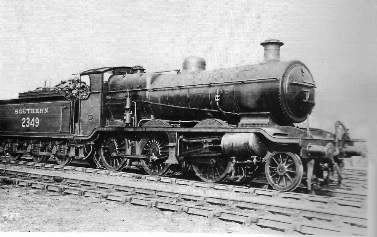 As a cleaner I was at the beck and call of everybody; that’s what made the job so interesting and varied. Call out messenger was a good number, we were given a note to call out a Driver and sometimes a Stoker if they had a change of shift or they were required for other duties. We had to go to their house find them and hand them the note then return to the Foreman with their reply. If we had no cycle we would have to walk, sometimes a round trip of 3 miles. If they were not at home we would try the local public house; for the most part we found them. The usual practical jokes were often played on new recruits including me. The most common were to tell a new cleaner an engine was urgently required but it was short of steam so, “go to stores with a bucket and get some” or “the shed rails required cleaning; take this emery cloth and give them a rub down.”
As a cleaner I was at the beck and call of everybody; that’s what made the job so interesting and varied. Call out messenger was a good number, we were given a note to call out a Driver and sometimes a Stoker if they had a change of shift or they were required for other duties. We had to go to their house find them and hand them the note then return to the Foreman with their reply. If we had no cycle we would have to walk, sometimes a round trip of 3 miles. If they were not at home we would try the local public house; for the most part we found them. The usual practical jokes were often played on new recruits including me. The most common were to tell a new cleaner an engine was urgently required but it was short of steam so, “go to stores with a bucket and get some” or “the shed rails required cleaning; take this emery cloth and give them a rub down.”
Above: K Class Engine* Stoked On My Exam
A small amount of cleaning was attempted from time to time. I often helped in the stores and sometimes in the administration office delivering bits of paper to a control centre a few hundred yards up the track. Next door to the office was a canteen; as well as getting tea or coffee for the office staff I always enjoyed a breakfast of egg on toast or something similar. One of the ladies that used to serve us was a Mrs. E. She was the wife of one of the drivers. Later when qualified I sometimes I stoked for him on local shunting duties but he was usually on the small diesel shunters in the local yards. His name was Peter.
As cleaners during our off duty time we would often gain valuable experience when invited by a friendly crew to join them on a trip out perhaps to Tonbridge or Reading. It was great and we learned a lot. The stokers often let us have a go and I enjoyed every minute of the outing.
In late October 1956 I was sent to Horsham for a week’s training and on the Friday took my practical exam. The examiner was a Mr. Shepherd, one of the Redhill foremen; I was to stoke a goods train from Three Bridges to Redhill. Mr. Shepherd talked to the driver the entire journey and appeared to take no notice of me whatsoever. Climbing off the engine at Redhill he said smiling, “You passed Mick”. I was now a Passed Cleaner, I felt so pleased.
* Examinations were verbal Q.A. About the British Railway rules. These were taken before the practical examination
Preparation and Disposal
The Story below is about Bill Mathews who was a driver at Redhill his father was a running Forman at Redhill and I seem to remember the duty foreman that night was a Mr. Pearman
Preparation and disposal (P.D.) of engines was, when busy was hard work and dirty; One duty shift was starting at 0001 and ending at 0800. First the disposal part; when an engine came into the shed, as a stoker, it would be my job to relieve the crew, usually at the turntable. After the engine had been turned and moved away from the turntable I would make a start on the firebox, and using fire irons and a large shovel, remove all the clinker from the firebox then bank the fire up just under the door.
The driver Mack would move the engine to the coal stage. If he was busy on other duties I would often move the engine myself. After receiving 2 or 3 hoppers of coal we would move back onto the pit, open the dampers and I would crawl underneath to rake out the ash pan, which had to done with some care, especially if the wind was a bit strong.
The next job was to empty the Smoke box of ash and make sure the door was properly closed when finished, then move back to the water crane and fill up with water. The U class engine had a capacity of 5 tons of coal and water capacity of 4000 gallons. The Q1 class again 5 tons of coal and 3700 gallons of water.
The preparation: Collect requirements from the stores such as oil paraffin cloths or wipers and sometimes a new fire iron. Check the lamps, trim and fill them, see that there were 12 detonators in the box and two red flags then build up the fire if necessary and see that the water injectors worked; if the engine was booked out soon, build up the fire and tidy up the footplate. Whilst all this was going on Mack the driver would be making all his checks and lubricating all parts of the engine that required attention. We would usually chat when finished and see that everything had been covered.
One night working on the midnight shift of preparation and disposal it was very quiet with not much work coming in, when I was called to the foreman’s office. On entering he was looking at his watch. He told me “You will have to call him out; he has not turned in.” It was about two thirty in the morning. I was given a piece of paper with an address just off Batts Hill a Driver Bill Mathews This man was known to be a bit nervous of the dark although he was a big man and I found him a nice chap to be on duty with, always offering a cigarette to all and wanting to share his sandwiches at meal breaks.
I set off on foot, It was a dark and windy night and there were no street lights on in 1956. In those days they were all turned off at midnight. It was so dark that when I turned into Linkfield Lane I had to find the curbside with my left foot and the path with my right foot, move slowly until I found Batts Hill which was the same, with overhanging trees and the wind blowing it was a real spooky outing.
I had no torch but eventually found the road and had to walk up to the houses and find the correct number. After knocking on the door for several minutes a bedroom light came on and big W put his head out of the bedroom window telling me to shut up as I would wake the neighbors.
I gave him the message; he closed the window and I waited — and waited, he did not appear. Eventually I made my way back to the depot and informed the foreman. “Did you find the house“? “Yes,” “Did you speak to him?” “Yes.” “All right well get a break now, thanks.” A nice cup of tea and a sausage was waiting.
When I saw big W later in the week he never mentioned the call out; neither did I. We both knew we had been the butt of a well thought out practical joke; well from time to time we had all played them.
Another time on the day shift P.D. I was again called into the foreman’s office. “Mick would you mind? That engine on the pits needs a bit of a clean underneath.” It was a bit of a mess but later in life I was to see a lot more. Some poor unfortunate person had decided to end it all by jumping in front of this engine. The main parts of the body had been removed at the scene of the incident. I was left to remove some sticky bits that had remained on wheels and under the engine. I found a hose and a bucket and the job was soon done. This represented the more serious side of some of the duties we had to perform.
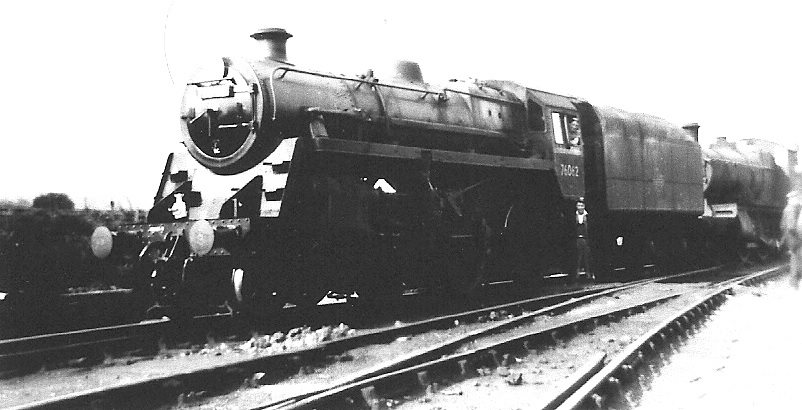
Photograph: John Bradby
Redhill 76062 Standard Class 4 MT C.1959
One run I often enjoyed was a ballast train from Woking to Redhill via Guildford. It had the advantage of having vacuumed braking throughout which meant that we could really get up a fair turn speed on the downhill stretches providing the signals were in our favor.
One of the local pick up sidings for goods was at a place called Homethorp Sidings just north of Redhill with usually about 10 wagons of silver sand that came from the local quarry. It was a real heavy pull out with a steep upward gradient for about 300 yards then onward on the main line to Redhill.
Accidents Happen
On the odd occasion unexpected incidents came along and we had to deal with them as quickly as possible, otherwise they could turn into a dangerous situation. Safety was always in my mind as most important. I was working with Mr. Parsons on a goods train from Reading to Redhill; this was a loose coupled mixed freight quite a heavy train and an N class Mogul 2-6-0 as our workhorse. Our trip had gone well and we were on time, it was the autumn season with falling leaves and light drizzle.
A mile and a half from Redhill; we had come through Reigate level crossing and station, from there on it was a downhill run with a slow left curve into Redhill Station. We both noticed the distant signal was on caution this was quite normal as we would not have a clear run through Redhill, being loose coupled meant we had to rely on the engine brakes and the guard to apply his break. We were moving slowly, the home signal on the bend was at danger and Mr. Parsons started to apply the engine brakes, I soon realized we were going to pass the signal at danger, at this point Mr. Parsons dropped the brake all the way down and we went into a skid we were being pushed along by 50 plus fright wagons. My driver who was a normally a slow methodical grumpy man moved quickly; he managed to get the engine into reverse gear put the sand applicator on then open the regulator in short bursts in the meantime I was busy applying the hand brake I am not sure if this made any difference at all but it was worth a try, we shuddered to a halt some 25 yards past the signal.
After a few seconds the signal lifted and we finished our journey in Redhill goods sidings, my driver said nothing.
Returning with the engine to the shed we slowly passed the signal box, the signalman stood at the window and gave us the thumbs up; all was well.
Serious wheel slip and the engine priming can be dangerous if not brought under control quickly; sometimes a combination of both would occur. Wheel slip often happened on frosty or wet days when starting away with heavy loads or on a steep incline. To help solve the problem of wheel slip engines had a sanding system that deposited sand in front of the driving wheels either by gravity or steam pressure unfortunately this did not always solve the problem.
Priming was a term used when water from the boiler rose an entered the front steam cylinders and spewed the water out of the chimney; the cause was usually a combination of high steam pressure and a full boiler. In both cases the remedy was to close down the regulator and open the cylinder cocks, this did not always work; when high pressure steam was passing through the regulator it was often most difficult to close.
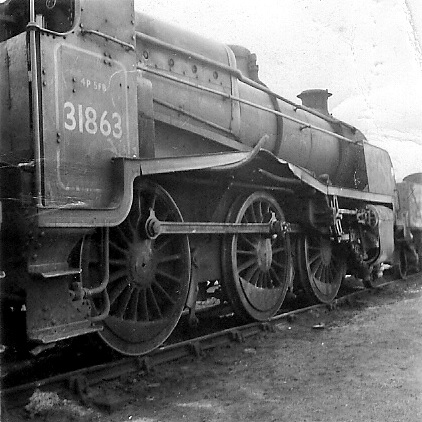
Photograph: John Bradby
This is the N class engine that was involved in a serious accident on Dorking Bank. My brother Charles was a stoker and went to help with the recovery when the accident happened. Photograph taken at Redhill shed.
This engine came to grief when hauling a goods train up Dorking bank, the engine started to prime then one of the front cylinders blew out, the driving rods became disconnected smashed into the engine frame and caused the engine to derail, A very scary experience indeed.
One shift was so easy it became quite a bore, as I remember the job was always early on a Sunday morning with a start at about 0430. After preparation take a small diesel shunting engine light { no carriages or goods } to Norwood Junction Locomotive Sheds in south London, then just a quick call at the foreman’s office to announce our arrival and bring another locomotive back to Redhill. The loco had been serviced and refueled at Norwood. The journey home again was long and slow. I think flat out we were lucky to reach 15 mph.
No stoking for me or filling the boiler just a lookout job. At that time in the morning on a Sunday in the late 1950’s it was so quiet, even East Croydon was empty we were the only thing moving at that time of the day.
Ronnie Biggs in his book describes in some detail his movements, work, and life in and around Redhill prior to the Great Train Robbery. He was married to Charmian Powell at Reigate Registry Office on 20th February 1960. His Son Nicholas Grant was born at Redhill County Hospital on 23rd July 1960. Many years before, my Mother was a midwife at this Hospital and as a child I had to attend with a few minor accidents but nothing really serious. Ronnie in his book on several pages mentions how he was working at a house in the Redhill area when he recruited an elderly train driver to move the diesel locomotive forward during the robbery. They left by train from Redhill in different compartments to meet up with other members of the gang in London. The name he mentions in his book His name was – – – – – . On several occasions I did the above trip from Norwood with a driver named – – – – – . I also did one or two shunting duties as his stoker. At other times on steam hauled goods runs. *Ronnie Biggs description of a man (in his book) fits this man well.
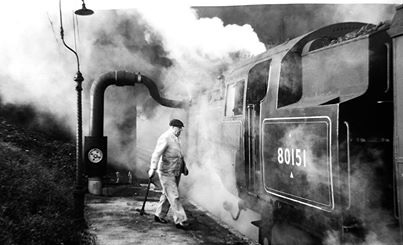
Shalford
Station with Conker Smith the driver
The Acid Bath
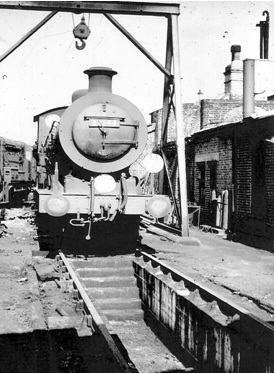 After leaving home at a young age still in my teens, and having been brought up in a restricted environment I was rather wild and ignorant. When I got away from home and into the real world, it had to be a fast learning curve which I was not entirely equipped to deal with. I was also a bit of a show off and often I did silly things.
After leaving home at a young age still in my teens, and having been brought up in a restricted environment I was rather wild and ignorant. When I got away from home and into the real world, it had to be a fast learning curve which I was not entirely equipped to deal with. I was also a bit of a show off and often I did silly things.
One that I vaguely remember after John* recounted it to me was the story of the acid bath; I had been underneath an engine via way of an inspection pit perhaps to empty the ash pan or maybe some other task. I was not wearing a cap and really got my hair in a mess with oil and grease. There was an acid bath nearby which the fitters used to clean scale and deposits from various copper fittings. I decided that the best course of action to clear my hair of the mess was to place it in this bath of murky brown liquid; I knew this was a cleaning agent.
Picture Left: 32544 standing near the fitter’s inspection pit and overhead gantry at Redhill. Picture John Bradby.
But in my ignorance I did not know the damage that acid could cause to a mere mortal like me. Fortunately somebody must have seen me because John and another were quite alarmed and insisted on washing my hair. This was in the large sink in the cleaner’s room; they made a good job cleaning thoroughly with soap and cold water. I am not sure I was grateful to them at the time, but I am now as I still have a crop of hair and a scalp, for which I am most grateful to John and the others that came to help me on that day.
Sunday April 13th 2008 Earlsdwood Surrey Quite unknown to me was the fact that John Bradby had some years ago made a short note in his papers about the incident.
When I visited him on April 13th 2008 he loaned me his writings and kindly gave me permission to reproduce the entry concerning the acid bath, the note below is exactly as written.
“There were two brothers** who started, one tall with a good build whilst the other was quite small in comparison. (He was a bit crackers***). One day we caught him washing his hair in the acid bath which the fitters put the dirty brass fittings in to remove the scale. We dragged him into the lobby and washed his hair again this time with cold water”.
John and I were cleaners and stokers together at Redhill M.P.D. (Engine Shed)
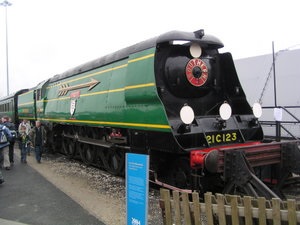 **My twin brother Charles
**My twin brother Charles
*** John was referring to me
21C123 West Country Class, Blackmore Vale on the Bluebell.
Jim Prouton
My Memory of Jim Prouton
In 2006 I decided to pay a visit to the Bluebell Railway situated in Sussex and muse about my times spent at Redhill as a cleaner and stoker. There were a good assortment of engines to watch and I was allowed into the sheds, it was a quiet day with not too many visitors. My intention was to gain a few photographs for my collection; some of the results will eventfully appear on the gallery page of this website. I had set out from Bedford early one Saturday morning and took the train via London to East Grinstead, and from there by bus onto Kingscote railway station and then by steam train to Sheffield Park.
I had a most enjoyable lunch in the Bessemer Arms there was plenty of time to spare before my return journey; I took the opportunity to talk with the driver and his mate on the footplate.
As soon as he heard I was a former stoker the invitation was given, “come up on board and chat.” “Where were you a stoker? — Redhill 75B, 1955 until 1961, — good lore! Really, — do you remember a chap called Pi**sey Prouten? — Yes I knew him well I was his stoker on many occasions.”
We chatted for about fifteen minutes, about our experiences; soon it was time to return home, it had been a good day.
Jim Prouton was his name and some have stated, “He was a legend in his own lifetime,” it was due his drinking habits and his manner that he became so well known.
It was a warm summer Saturday evening Jim was the driver and I was his stoker, Our Journey would be to Redhill to Tonbridge with an N class engine, this was an easy trip with a set of 3 coaches. On completion we were turned at Tonbridge M.P.D. and parked were in a goods siding just near Tonbridge station and very close by was the railway club. “Is that fire alright for half an hour Mick”? – “Yes its fine,”— “Right fill her up we are going for a pint,–follow me.” I believe we climbed a small wall or fence and the club was only a few paces away; Jim ordered the beer “two pints of best bitter please” — then turning to me,–“now drink this it will turn you into a man,” — thanks Jim.”
I did enjoy, it was a most refreshing cool beer. The club was crowded with off duty railway men with there wives and girlfriends, a few were in uniform they were, porters, guards either just coming off duty or perhaps some would be going on nightshift. “Look at the crumpet Mick, look at that one standing next to you, a lovely bit of stuff,”
Jim was at times a bit of an embarrassment; especially when he had a few drinks and I am sure he enjoyed his reputation.
Soon I left the club to check on the engine, Jim followed me about 15 minutes later, I was busy building the fire for our return trip to Redhill which was uneventful Jim spent the trip talking about the young ladies in the club.
Jack Street
I am grateful to Jack Street for the loan of his written records about his time on the railways and the story below concerning Jim Prouton.
One Saturday night I was booked on with Jim to work the 2004 passenger train from Redhill to Reading and return with the “Biscuits” a goods train from Huntley and Palmers factory at Reading just after 2300. Before we left the shed we had to prepare our engine and Jim, as usual, had left it all to me while he had nipped up to the tap room of the Lakers Hotel for a couple of pints. I got to work on our loco which was an S15 class or King Arthur 4-6-0 goods as we called them. About a minuet before we were due out Jim came dashing back up the road from the Lakers and joined me on the footplate. Off we went to the station and as we backed onto our train I could see I was in for a rough time, for instead of its normal three coaches our train consisted of nine, the extra six coaches was part of a special and some bright spark in control had decided the Reading portion could be added to our train. Eventually we set off and things were going alright until we left Guildford when it was quite a struggle to keep the steam pressure up, I had to keep my injector going most of the time so this didn’t help the steam pressure.
To the uninitiated the injector is worked by steam and is a means of bringing water from the tender to the boiler. As we were about to leave Sandhurst Halt my injector stopped working, going over to Jim’s side of the loco to use his injector, I found the water cock open. This was situated at the rear of Jim’s seat so somehow he must have knocked it open.
We had been loosing water for goodness knows how long. Suddenly a horrible thought occurred to me; jumping up onto the tender I opened the water flap and dropped a piece of coal in.
Instead of a splash there was a dull thump as the coal hit the bottom of the tank, proving my worst fears, the tank was empty, we had run out of water. The nearest water column being at Reading there was only one thing to do, throw the fire out, thus avoiding a big bang and a vast amount of damage to the loco. The guard went to inform control by phone, he then spoke to the passengers to tell them what was happening while Jim went of to the nearest pub to inform the landlord. After a lot of hard work I managed to throw out all of the fire, allowing the boiler to cool down avoiding any damage.
This was not the end of our troubles we had received a message from control saying that a major water main had burst at Reading so there wasn’t any water available there. It was decided that the train that had left Redhill one hour after us, the 2104 would, as it could not get past us, come up behind and push us into Reading. at last the 2104 from Redhill pulled up behind us. The loco was an N class pulling a three coach set, crewed by driver Tommy Flight and his fireman Fred Davis, from Reading shed. They thought the whole thing was a huge joke and were quite looking forward to the overtime it would give them. After coupling up and receiving the green light from the guard we set off for our journeys end at Reading. We must have looked a strange sight running along in the darkness, led by a dead S15 loc, followed by nine coaches an N class loco pounding away for all it’s worth pulling another three coaches.
Originally we were due in Reading at 2204 but by the time we arrived it was past midnight. We then had to wait at the station while Tommy Flight’s train was pulled away to release his loco so that he could make his way to the shed and then home to bed, Soon it was our turn to be released and we finally made our way to Reading shed for a well earned cup of tea. We were due to have booked off duty back at Redhill at 0300. But because of the burst water main at Reading we had to wait until just after 0500 before things were back to normal and we could make our way back home. After an uneventful journey we arrived back at Redhill just before 0800, where we were met by Harry Taylor the Shedmaster, who for some reason or another did not appear to be in a very good mood. I was very displeased with Jim my driver for he tried to lay all the blame on me by saying I could not have filled the tender up with water before we left Redhill the previous night. I knew that I did fill the tender up and I reminded Jim that he had left me on my own to prepare the engine while he went up to the pub. An inquiry was held a couple of days later to which my driver was summoned to attend. I was not asked to go so I do not know what transpired, suffice to say that when Jim returned he was quite happy to report. “We had got away with it.”
Redhill Shed from the Sand hill above and beyond
